人教版九年级英语笔记整理
- 格式:docx
- 大小:26.34 KB
- 文档页数:8
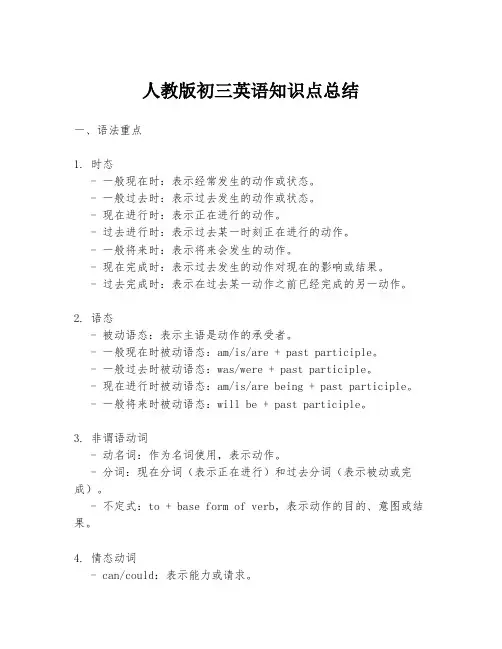
人教版初三英语知识点总结一、语法重点1. 时态- 一般现在时:表示经常发生的动作或状态。
- 一般过去时:表示过去发生的动作或状态。
- 现在进行时:表示正在进行的动作。
- 过去进行时:表示过去某一时刻正在进行的动作。
- 一般将来时:表示将来会发生的动作。
- 现在完成时:表示过去发生的动作对现在的影响或结果。
- 过去完成时:表示在过去某一动作之前已经完成的另一动作。
2. 语态- 被动语态:表示主语是动作的承受者。
- 一般现在时被动语态:am/is/are + past participle。
- 一般过去时被动语态:was/were + past participle。
- 现在进行时被动语态:am/is/are being + past participle。
- 一般将来时被动语态:will be + past participle。
3. 非谓语动词- 动名词:作为名词使用,表示动作。
- 分词:现在分词(表示正在进行)和过去分词(表示被动或完成)。
- 不定式:to + base form of verb,表示动作的目的、意图或结果。
4. 情态动词- can/could:表示能力或请求。
- may/might:表示可能性。
- must:表示必须或强烈义务。
- should/ought to:表示建议或应当。
5. 句子结构- 简单句:一个主语和一个谓语。
- 并列句:使用并列连词连接两个或多个简单句。
- 复合句:包含一个主句和至少一个从句。
- 定语从句:修饰名词或代词的从句。
- 状语从句:表示时间、地点、原因、条件、结果等。
二、词汇与短语1. 常见词汇- 描述人物特征的形容词:kind, honest, creative, etc.- 描述日常活动的动词短语:clean up, take out, turn off, etc.- 描述情感和情绪的名词:happiness, sadness, anger, etc. - 描述天气的词汇:sunny, rainy, windy, etc.2. 短语搭配- 动词短语搭配:finish doing, stop to do, remember to do, etc.- 形容词与介词的搭配:afraid of, interested in, good at, etc.- 常用口语表达:What's up?, How about…?, It's up to you, etc.三、阅读理解技巧1. 快速阅读(Skimming)- 快速浏览文章,抓住主旨大意。
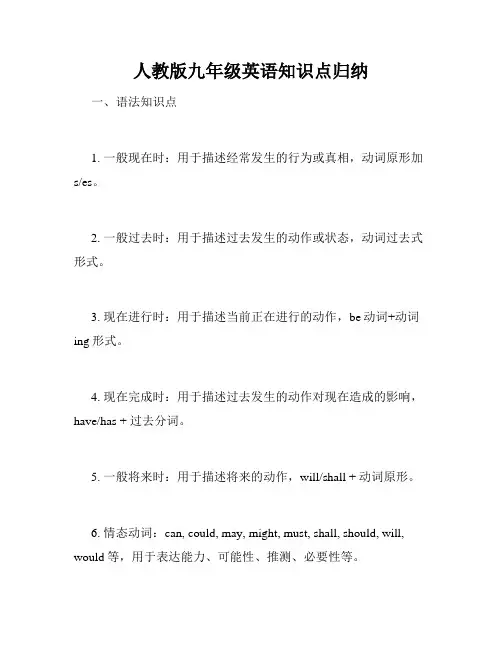
人教版九年级英语知识点归纳一、语法知识点1. 一般现在时:用于描述经常发生的行为或真相,动词原形加s/es。
2. 一般过去时:用于描述过去发生的动作或状态,动词过去式形式。
3. 现在进行时:用于描述当前正在进行的动作,be动词+动词ing形式。
4. 现在完成时:用于描述过去发生的动作对现在造成的影响,have/has + 过去分词。
5. 一般将来时:用于描述将来的动作,will/shall + 动词原形。
6. 情态动词:can, could, may, might, must, shall, should, will, would等,用于表达能力、可能性、推测、必要性等。
7. 定语从句:用于对名词进行修饰和限制,引导词有关系代词和关系副词。
8. 倒装句:用于强调句子中的某一部分,将助动词或情态动词放在主语之前。
9. 被动语态:用于强调动作的承受者,be动词+过去分词。
10. 状语从句:用于修饰句子中的动作或状态,引导词有时间、原因、条件等。
二、词汇知识点1. 动词短语:由动词和副词、介词构成的短语,如give up,look after, think of等。
2. 同义词和反义词:指意义相同或相反的词语,如happy和glad、buy和sell等。
3. 词汇拓展:指根据前缀、后缀或词形变化,拓展词汇的能力。
4. 高频词汇:指经常出现在九年级英语课本和考试中的单词,如important, improve, knowledge等。
5. 词义辨析:指对意义相近但用法不同的词进行区分,如listen和hear、borrow和lend等。
三、阅读技巧1. 主旨大意:通过阅读文章的首句、末句和段落标题等,找出文章的主题或中心思想。
2. 查找信息:通过快速阅读或扫读,找出与特定问题或关键词相关的信息。
3. 推理判断:根据文章中的暗示或细节推断出未写明的信息或作者的观点。
4. 阅读策略:如预测题目、通读全文、找关键词等,帮助提高阅读效率和准确性。
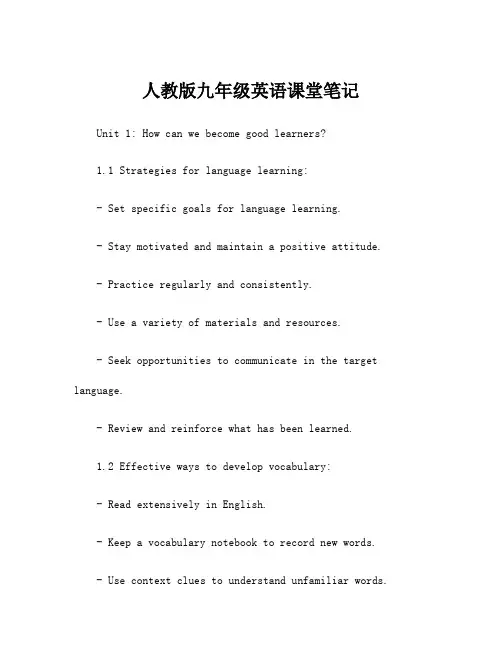
人教版九年级英语课堂笔记Unit 1: How can we become good learners?1.1 Strategies for language learning:- Set specific goals for language learning.- Stay motivated and maintain a positive attitude.- Practice regularly and consistently.- Use a variety of materials and resources.- Seek opportunities to communicate in the target language.- Review and reinforce what has been learned.1.2 Effective ways to develop vocabulary:- Read extensively in English.- Keep a vocabulary notebook to record new words.- Use context clues to understand unfamiliar words.- Use flashcards or online tools for vocabulary practice.- Review and revise vocabulary regularly.- Apply learned words in speaking and writing.1.3 Skills for reading comprehension:- Skim the text to get a general idea.- Scan for specific information.- Pay attention to headings, subheadings, and formatting.- Look for context clues to understand unfamiliar words.- Make predictions and infer meaning from context.- Summarize the main points of the text.1.4 Strategies for listening comprehension:- Pay attention to the speaker's body language and facial expressions.- Focus on keywords and phrases.- Take notes while listening.- Ask questions for clarification.- Practice listening to a variety of accents and speech speeds.- Listen to authentic materials, such as podcasts or videos.1.5 Techniques for effective note-taking:- Use abbreviations and symbols to save time.- Write down key information and main ideas.- Organize information using headings and subheadings.- Use diagrams or mind maps to visualize information.- Review and revise notes after the lecture or class.- Highlight important points or concepts.1.6 Strategies for overcoming difficulties:- Seek help from teachers or classmates when facing challenges.- Break tasks into smaller, manageable parts.- Develop a growth mindset and believe in one's potential.- Practice self-reflection and learn from mistakes.- Find strategies or techniques that work best for individual learning styles.- Stay persistent and persevere through difficult times.Unit 2: Why don't you get her a ticket to the concert?2.1 Making suggestions and offers:- Why don't you...?- How about...?- I suggest...- Would you like me to...?- Do you want...?- Let's...2.2 Expressing preferences:- I prefer...- I'd rather...- I'm more interested in...- I'm not really into...- I'd love to...- I'm not keen on...2.3 Giving and asking for advice: - You should...- It would be a good idea to... - Have you thought about...?- What do you recommend?- What's your opinion on...?- Can you give me any advice on...?2.4 Responding to advice and suggestions:- That's a great idea!- I'll definitely consider it.- I'm not sure about that.- I don't think it's a good option.- Thanks for the suggestion, but I think I'll pass. - I'll think it over and let you know.2.5 Talking about possible outcomes:- If you go to the concert, you'll have a great time. - If you study hard, you'll get good grades.- If it rains, we'll have to stay indoors.- If she misses the bus, she'll be late for school. - If we leave now, we'll catch the train.- If you don't hurry, you'll miss the deadline.2.6 Offering alternatives:- Instead of going to the movie, we could go bowling.- If you don't like pizza, we can order Chinese food.- Rather than taking the bus, you could ride your bike.- If she can't attend the party, we'll invite someone else.- In case of bad weather, we can have the picnic indoors.- If the store is closed, we'll try another one.。

九年级人教版英语学习笔记Document serial number【NL89WT-NY98YT-NC8CB-NNUUT-NUT108】Unit1Howcanwebecomegoodlearners1、How引导的特殊疑问句:①询问方式或手段:“怎样”如:HowdoyoustudyEnglish?---Istudybyreadingaloud.②用于彼此间打招呼、问候、询问身体状况:如:Howdoyoudo---HowdoyoudoHowareyou---I’mfine/well/Ok.③询问天气或程度:如:How’stheweather=What’stheweatherlike?----It’ssunny/cloudy/raining.④询问年龄:如:Howoldisshe=What’sherage?---Sheis15(yearsold)⑤征求意见或建议用:Howabout=Whatabout+n/代词/V-ing.如:Howabout_______(play)basketball?⑥询问频率用:Howoften如:Howoftendoyouexercise---Onceaday.⑦询问可数名词的数量用:Howmany如:Howmanystudentsarethereinyourclass?---Thereare50studentsinourclass⑧询问不可数名词的数量用:Howmuch.如:Howmuchmeat____(be)thereinthefridge?---Onlyalittle.此外:Howmuch还可以用于询问价格。
Howmuchisyourcoat---It’s50yuan.注:询问价格用:Howmuchis/aresth=What’sthepriceofsth东西有贵(expensive=dear)贱(cheap=inexpensive),价格(price)有高(high)低(low)如:Thiscoatisverycheap. Thepriceofthiscoatisverylow.⑨询问次数用:Howmanytimes“多少次”如:Howmanytimesdoyougototheparkaweek?----Threetimes.⑩询问长度、时间长短用:Howlong如:Howlongistheboat----About3meters.Howlongwillyoustaythere?---For2days注:用Howlong提问,用:For+时间段或since+时间点回答(其中,for可以省略)。
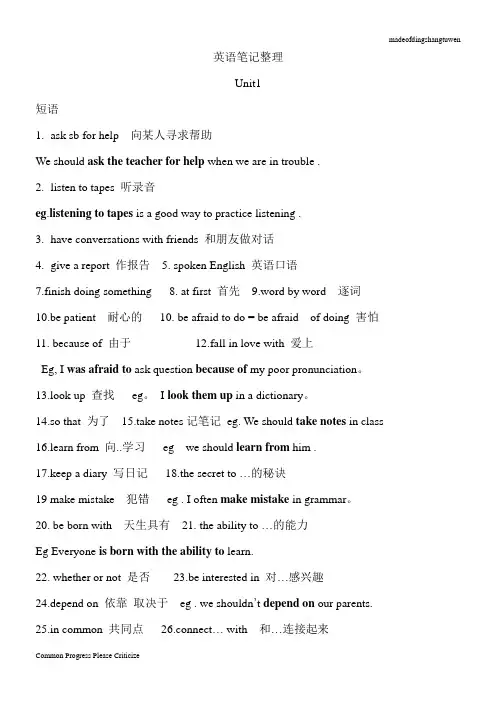
英语笔记整理Unit1短语1.ask sb for help 向某人寻求帮助We should ask the teacher for help when we are in trouble .2.listen to tapes 听录音eg.listening to tapes is a good way to practice listening .3.have conversations with friends 和朋友做对话4.give a report 作报告5. spoken English 英语口语7.finish doing something 8. at first 首先9.word by word 逐词10.be patient 耐心的10. be afraid to do = be afraid of doing 害怕11. because of 由于12.fall in love with 爱上Eg, I was afraid to ask question because of my poor pronunciation。
13.look up 查找eg。
I look them up in a dictionary。
14.so that 为了15.take notes记笔记eg. We should take notes in class16.learn from 向..学习eg we should learn from him .17.keep a diary 写日记18.the secret to …的秘诀19 make mistake 犯错eg . I often make mistake in grammar。
20. be born with 天生具有21. the ability to …的能力Eg Everyone is born with the ability to learn.22. whether or not 是否23.be interested in 对…感兴趣24.depend on 依靠取决于eg . we shouldn’t depend on our parents.25.in common 共同点26.connect… with 和…连接起来eg :Good learners have some good habits in common.27.pay attention to 留心eg。
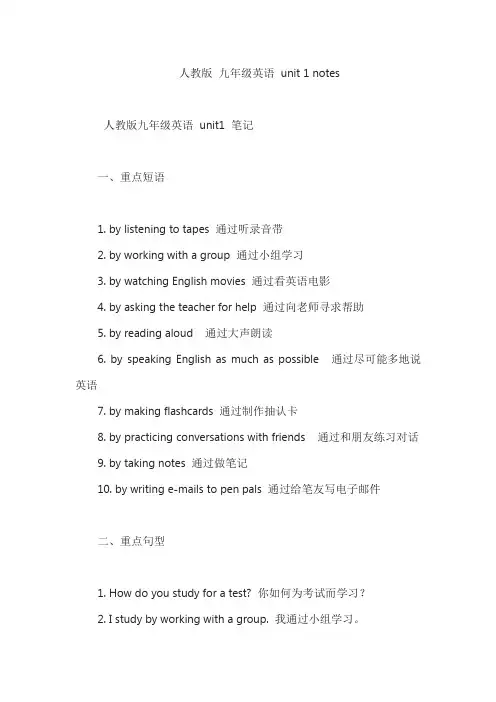
人教版九年级英语unit 1 notes人教版九年级英语unit1 笔记一、重点短语1. by listening to tapes 通过听录音带2. by working with a group 通过小组学习3. by watching English movies 通过看英语电影4. by asking the teacher for help 通过向老师寻求帮助5. by reading aloud 通过大声朗读6. by speaking English as much as possible 通过尽可能多地说英语7. by making flashcards 通过制作抽认卡8. by practicing conversations with friends 通过和朋友练习对话9. by taking notes 通过做笔记10. by writing e-mails to pen pals 通过给笔友写电子邮件二、重点句型1. How do you study for a test? 你如何为考试而学习?2. I study by working with a group. 我通过小组学习。
3. It’s too hard to understand the voices. 声音太难听懂了。
4. What about reading aloud to practice pronunciation? 大声朗读来练习发音怎么样?5. I have a lot of trouble memorizing new words. 我在记新单词方面有很多困难。
6. I find it easy to learn English. 我发现学习英语很容易。
三、词语辨析1. too...to... 太……而不能……,表否定so...that... 如此……以至于……,表肯定例:He is too young to go to school. 他太小了以至于不能去上学。
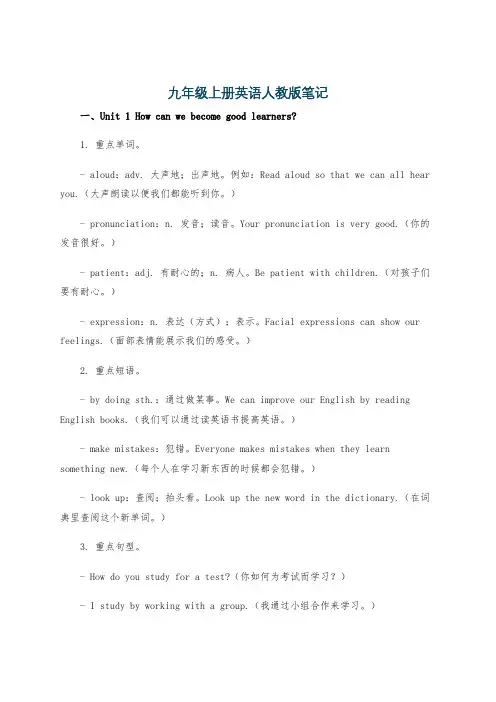
九年级上册英语人教版笔记一、Unit 1 How can we become good learners?1. 重点单词。
- aloud:adv. 大声地;出声地。
例如:Read aloud so that we can all hear you.(大声朗读以便我们都能听到你。
)- pronunciation:n. 发音;读音。
Your pronunciation is very good.(你的发音很好。
)- patient:adj. 有耐心的;n. 病人。
Be patient with children.(对孩子们要有耐心。
)- expression:n. 表达(方式);表示。
Facial expressions can show our feelings.(面部表情能展示我们的感受。
)2. 重点短语。
- by doing sth.:通过做某事。
We can improve our English by reading English books.(我们可以通过读英语书提高英语。
)- make mistakes:犯错。
Everyone makes mistakes when they learn something new.(每个人在学习新东西的时候都会犯错。
)- look up:查阅;抬头看。
Look up the new word in the dictionary.(在词典里查阅这个新单词。
)3. 重点句型。
- How do you study for a test?(你如何为考试而学习?)- I study by working with a group.(我通过小组合作来学习。
)- The more you read, the faster you'll be.(你读得越多,你就会读得越快。
)二、Unit 2 I think that mooncakes are delicious!1. 重点单词。
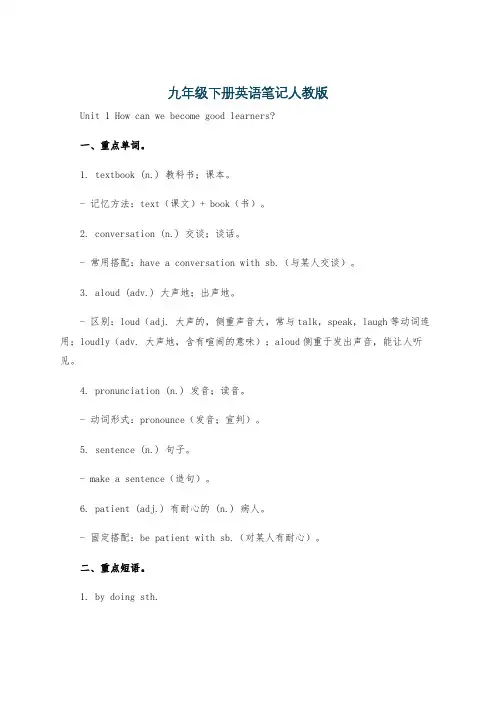
九年级下册英语笔记人教版Unit 1 How can we become good learners?一、重点单词。
1. textbook (n.) 教科书;课本。
- 记忆方法:text(课文)+ book(书)。
2. conversation (n.) 交谈;谈话。
- 常用搭配:have a conversation with sb.(与某人交谈)。
3. aloud (adv.) 大声地;出声地。
- 区别:loud(adj. 大声的,侧重声音大,常与talk,speak,laugh等动词连用;loudly(adv. 大声地,含有喧闹的意味);aloud侧重于发出声音,能让人听见。
4. pronunciation (n.) 发音;读音。
- 动词形式:pronounce(发音;宣判)。
5. sentence (n.) 句子。
- make a sentence(造句)。
6. patient (adj.) 有耐心的 (n.) 病人。
- 固定搭配:be patient with sb.(对某人有耐心)。
二、重点短语。
1. by doing sth.- 意思:通过做某事。
例如:You can improve your English by reading English books.(你可以通过读英语书提高英语水平。
)2. make mistakes.- 意思:犯错。
例如:Everyone makes mistakes when they learn something new.(每个人在学习新东西的时候都会犯错。
)3. look up.- 意思:(在词典、参考书中或通过电脑)查阅;抬头看。
例如:Look up the word in the dictionary if you don't know it.(如果你不认识这个单词就查字典。
)三、重点句型。
1. What about reading aloud to practice pronunciation?- 分析:What about...? 用于提出建议或征求意见,其后接名词、代词或动名词形式。
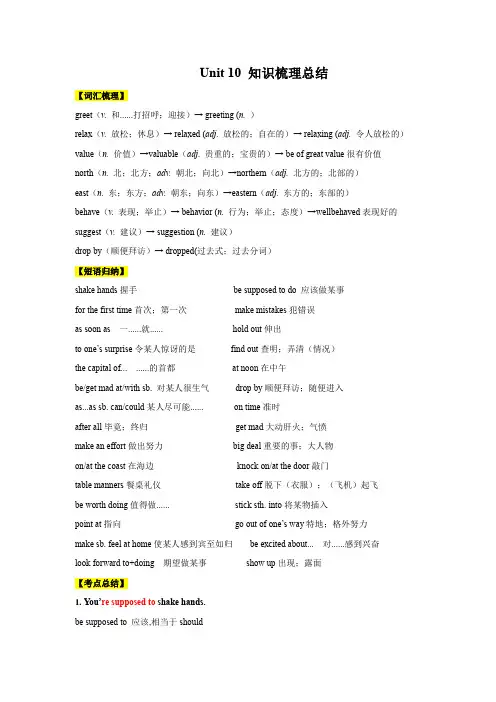
Unit 10 知识梳理总结【词汇梳理】greet(v.和......打招呼;迎接)→ greeting (n. )relax(v.放松;休息)→ relaxed (adj. 放松的;自在的)→ relaxing (adj. 令人放松的)value(n.价值)→valuable(adj.贵重的;宝贵的)→ be of great value很有价值north(n.北;北方;adv.朝北;向北)→northern(adj.北方的;北部的)east(n.东;东方;adv.朝东;向东)→eastern(adj.东方的;东部的)behave(v.表现;举止)→ behavior (n. 行为;举止;态度)→wellbehaved表现好的suggest(v.建议)→ suggestion (n. 建议)drop by(顺便拜访)→ dropped(过去式;过去分词)【短语归纳】shake hands握手be supposed to do 应该做某事for the first time首次;第一次make mistakes犯错误as soon as 一......就...... hold out伸出to one’s surprise令某人惊讶的是find out查明;弄清(情况)the capital of... ......的首都at noon在中午be/get mad at/with sb. 对某人很生气drop by顺便拜访;随便进入as...as sb. can/could某人尽可能...... on time准时after all毕竟;终归get mad大动肝火;气愤make an effort做出努力big deal重要的事;大人物on/at the coast在海边knock on/at the door敲门table manners餐桌礼仪take off脱下(衣服);(飞机)起飞be worth doing值得做...... stick sth. into将某物插入point at指向go out of one’s way特地;格外努力make sb. feel at home使某人感到宾至如归be excited about... 对......感到兴奋look forward to+doing 期望做某事show up出现;露面【考点总结】1.You’re supposed to shake hands.be supposed to 应该,相当于shoulde.g.We are supposed to help each other.=We should help each other.【注】suppose意为“认为;推断”时,其后常接宾语从句,在宾语从句中否定要前移。
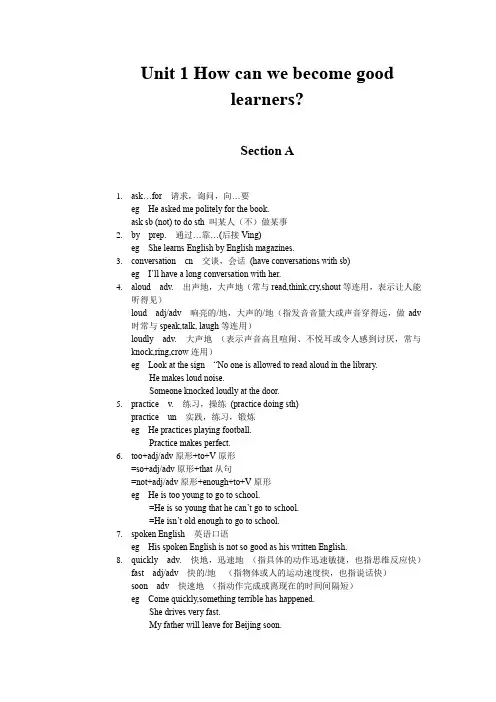
Unit 1 How can we become goodlearners?Section A1.ask…for 请求,询问,向…要eg He asked me politely for the book.ask sb (not) to do sth 叫某人(不)做某事2.by prep. 通过…靠…(后接Ving)eg She learns English by English magazines.3.conversation cn 交谈,会话(have conversations with sb)eg I’ll have a long conversation with her.4.aloud adv. 出声地,大声地(常与read,think,cry,shout等连用,表示让人能听得见)loud adj/adv 响亮的/地,大声的/地(指发音音量大或声音穿得远,做adv 时常与speak,talk, laugh等连用)loudly adv. 大声地(表示声音高且喧闹、不悦耳或令人感到讨厌,常与knock,ring,crow连用)eg Look at the sign---“No one is allowed to read aloud in the library.He makes loud noise.Someone knocked loudly at the door.5.practice v. 练习,操练(practice doing sth)practice un 实践,练习,锻炼eg He practices playing football.Practice makes perfect.6.too+adj/adv原形+to+V原形=so+adj/adv原形+that从句=not+adj/adv原形+enough+to+V原形eg He is too young to go to school.=He is so young that he can’t go to school.=He isn’t old enough to go to school.7.spoken English 英语口语eg His spoken English is not so good as his written English.8.quickly adv. 快地,迅速地(指具体的动作迅速敏捷,也指思维反应快)fast adj/adv 快的/地(指物体或人的运动速度快,也指说话快)soon adv 快速地(指动作完成或离现在的时间间隔短)eg Come quickly,something terrible has happened.She drives very fast.My father will leave for Beijing soon.9.word by word 逐字地day by day 日复一日one by one 逐个10.patient adj 有耐心的,耐烦的(be patient with/to…对…有耐心)n 病人eg We all like Mr.Smith.He is very patient with us.The nurse is looking after the patient.11.not…everything 表示部分否定,could not understand everything “并非每件事都能理解”当every,all,always等表示整体意义的词与not连用时,表示部分否定eg I didn’t find everyone on the playground.Not all balls are round in the USA.12.secret cn 秘密,机密(keep a secret保密;in secret秘密地)adj 秘密的,隐秘的eg Exercising every day is the secret of health.It’s a secret passage.13.look up (在字典或资料中)查找;向上看,仰视eg I’ve forgotten the number,you should look it up again.They looked up,and found many locusts.14.repeat =do or say…again15.take a note/take notes 记笔记16.memorize v 记忆,记住(指有意识地用心地去记,强调主观的动作过程memory nremember v 记得(指某件事或印象在记忆里,一般不需要有意识地去记忆便可以想起)eg She tried to memorize every event.She remembered event that happened in these years.17.be afraid of doing sth 担心而害怕做某事be afraid to do sth 怕而不敢做某事eg The girl was afraid to go across the bridge,for she was afraid of falling downfrom it.Section B1.increase to 增到,增加到(后+总数)eg The population of this city has increased to 3,000,000by now.increase by 以…的幅度增加,增加了…eg The population of this factory increased by 10 percent last year.2.at the speed of 以…速度at top/full/high speed 高速,全速eg Your taxi traveled at the speed of 80 miles an hour.It’s dangerous to turn round the corner at high speed.3.be born 出身于be born with 天生具有…be born to do sth 天生能做某事eg He was born in a small village.Her cousin brother was born with a mole(胎记) on the shoulder.Man was born to cry,so it’s with other animals.4.have the ability to do sth 有能力做某事eg Jenny is the first person for the job,she has the ability to communicate.5.take an interest in=be interested in 对…感兴趣lose interest in 对…失去兴趣eg She seems to take an interest in discussing the trip.He has lost interest in fishing.6.create v 创造,创建,创作creative adj 创造性的,有创意的creation n 创造,创建7.It’s +adj +for sb to do sth 对某人来说做某事是……It’s +adj +of sb to do sth (adj是表示情感,特征的词:kind ,nice ,good ,silly ,wrong ,wise等) eg It’s hard for you to finish it.It’s kind of you to say so.8.pay attention to 注意…留心…(to是介词,后接n/pron/Ving)eg Your spoken English is a little poor.Please pay attention to it.As you see,Sam didn’t pay much attention to watching TV.9.connect…with…把…和…连接起来connect…to…把…连上eg First,the light is connected to a switch.Don’t connect the matter with what happened last week.10.even if =even though即使,纵然eg I wouldn’t give up even if I should fail a second time.I can still remember even though it happened so long ago.11. unless=if…not…如果不,除非eg You’ll be late unless you hurry.=You’ll be late if you don’t hurry.Unit 2 I think mooncakes are delicious!Section A1.a little too 太……一点eg Kevin was a little too young to dress himself.2.put on 增加(体重)发胖+weight穿上,戴上+衣物eg Last month,Joan put on some weight.Mr.Weevers put on his hat and hurried out.3.pound cn 重量单位“磅”.货币单位“英镑”eg two pounds of milkAfter the Sichuan earthquake,the British government gave away1,000,000 pounds. 4.shoot down 击落,击毁eg An US UA V was shot down in Iran last year.5.try to do sth 尽力做某事(但不一定成功).try doing sth 尝试做某事eg She tried to climb onto the bank(河岸),but failed.You always travel by train,why not try taking a bus for a change?6.steal 偷,窃取(stole stolen). steal sth from 从……偷某物eg The child stole a book from the shelf..have sth stolen 某物被偷eg She had her purse(钱包)stolen.7.so……that……如此……以至于…….so+adj/adv+that从句.so+adj+a/an+单数名词+that从句.so+many/few+复数名词+that从句.so+much/little+不可数名词+that从句eg He is so young that he can’t go to school.He made so many mistakes that he failed the exam..such……that……如此……以至于…….such+a/an+单数名词+that从句.such+复数名词/不可数名词+that从句.such+a/an+adj+n+that从句.such+adj+复数名词/不可数名词+that从句eg He is such a good student that we all believe him.It was such bad weather that we had to stay at home.y v 平放,放置(lay out 摆开,布置)产卵,下蛋eg Mrs,Turner laid out the flowerpots in her garden.How strange it is to see the hen lay two eggs a day!lie----lying----lay----lain 躺,位于lie----lying----lied----lied 撒谎lay----laying----laid----laid 平放,产卵9.admire vt 欣赏,观赏(admire sth 欣赏某物)Vt 钦佩,羡慕(admire……for……因……而钦佩……)eg Standing on the top of the mountain,you can admire the beauty of the whole city.We admire Ann for her courage.10.tie cn 领带(a shirt and tie). v 拴,扎,系,绑(tie…to…将…拴到…)eg It’s formal(正式)to wear a shirt and tie if you go to a party.Please tie your dog to the tree.11.感叹句的种类How引导的感叹句(1)How+adj+主语+谓语!(2)How+adv+主语+谓语!(3)How+adj+a/an+单数名词+主语+谓语!(4)How+主语+谓语!eg How blue the sky is!How well she danced that day!How interesting a book it is!How time flies!What引导的感叹句(1)What+a/an+单数名词+主语+谓语!(2)What +不可数名词+主语+谓语!(3)What+复数名词+主语+谓语!(4)What+a/an+adj+单数名词+主语+谓语!(5)What+adj+不可数名词+主语+谓语!(6)What+adj+复数名词+主语+谓语!eg What a horse it is!What fun it was!What colors they are!What a nice girl she is!What fine weather it was last week!What silly questions they are.Section B1.trick cn 恶作剧,闹剧(play a trick on sb 捉弄某人)eg The kids played tricks on Harvey when he was young.2.treat cn 招待,款待v 对待,把…看作(treat…as…把…看作…) eg It’s my treat.Don’t treat his words as a joke.3.dress up as+sb 装扮成某人dress up in+服装或颜色穿上…eg The kids are dressing up as pirates(海盗)Father Christmas often dresses up in red.4.mean adj 小气的,吝啬的,自私的(be mean with…对…吝啬)v 意味着,意欲mean doing sth 意味着做某事mean to do sth 打算做某事not mean to do sth 不是有意做某事eg Mr.Marley was mean with almost everything.That would mean wasting a lot of labor.Really?I don’t mean to waste any labor.I don’t mean to be late ,sir.5. business un 商业,生意.un 职责,事务,事(on business 出差).cn 商铺,商店eg Sometimes,business English is hard to learn.Mr.Wang has gone to Hainan Island on business.She has a business in Paris.5.punish sb for (doing) sth 因为(做)某事而处罚某人eg He was punished for breaking the school rules.6.warn sb of sth 警告某人某事warn sb (not) to do sth 警告某人(不)做某事warn sb +that从句eg We’ve warned the kids of the risk of electricity.We’ve been warned not to go out these days.I warned her that snakes are dangerous.7. end up doing sth 最终成为…结果为…eg I didn’t like it at first,but we ended up cheering.end up with 以…告终eg Their game ended up with a quarrel.7.present un 现在,目前(at present).cn 礼物赠品.adj 现在的,目前的.出席的,到场的eg At present,everything goes well.My uncle sent me an iPad as a birthday present.What do you think of your present company,David?The present guests were all in high spirit.8.spread v/n 传播,蔓延eg The fire spread in a short time.China has successfully controlled the spread of bird flu.(禽流感)9.hiding n 躲藏,隐藏处(in hiding 躲藏着;go into hiding 躲起来)eg Tom and his sister went into hiding when they heard the sound of their mother’s footsteps.10.hunt n 搜索,搜寻(hunt for)eg The hunt for the sunk ship(沉船) continue11.not only…but also…不但…而且…(连接两个相对称的并列成分,若连接两个主语时要实行就近原则)eg Not only Mr.lin bt also his son loves the movies.Unit 3 Could you please tell me wherethe restrooms are?Section Armation un 消息(表示通过打听、学习、观察等方式获得的资料).news un 新闻,消息(指人们感兴趣的或近来发生的事情,尤指通过广播、电视、报纸等事情).message cn 消息,口信(指口头或书信传递给他人的消息)eg We need some information.He often sends me short messages.We listen to the news on the radio.2.Could you please+V原形…….?请你…….好吗?.Could you please not+V原形……? 请你不要……好吗?(其回答中不能用could,只能用can.即Yes,I can.或No/Sorry,I can’teg Could you please be here a little earlier?Sorry,I can’t.3.beside prep 在旁边,在附近=next to/close tobesides prep 除…之外还…eg A girl is standing beside the tree.Dis anyone else come besides Jack?4.get sb sth=get sth for sb(get是“买到,弄到,得到”之意)eg Who’d like to get some chalk for me?=Who’d like to get me some chalk?5.pardon v 原谅(主要用于没听清对方说话时,恳请对方再说一遍).excuse me 打扰一下(主要用于吸引别人的注意,有麻烦或打扰之意所做之事可能会使别人不愉快或不方便,诸如插话、失陪、提出请求、纹路等)eg Can I ask you some questions?Pardon?Excuse me,can you tell me where the bank is?6.need v 需要(实义动词)need to do sth 需要去做某事need doing sth 需要被做某事eg Harold needed to bring drinks.Potatoes need cooking a little longer.7.suggest v 使人想到,使人联想,提议,建议suggest sth (to sb)=suggest (to sb) (向某人)提议/建议…suggest doing sth 提议/建议做某事suggest +that从句(虚拟语气,其谓语用should+动词原形,should常被省略)eg What did you suggest to the manager?I suggested going home at once.I suggest (that) we go out to eat.8. psaa by 经过,路过,从…旁边经过.go by 流逝,过去eg He passed by without greeting me.Time goes by.8.宾语从句(2)类型①连词that引导的宾语从句由陈述句转化而来,that无意义,that可省略eg I think (that) she’ll be back soon.He didn’t know (that) his brother was also there.that在下列情况中不宜省略主句与宾语从句间有插入语eg She said here,in her letter,that she was getting on well with her studies.出现两个或以上的宾语从句,此时只有第一个that可以省略,其余的不能省略eg Danny told me (that) he would go to Canada and that he had been there once.②连词代词who,whom,what,which,whose和when, where,why,how等引导的宾语从句由特殊疑问句转化而来,这些连接代词或连接副词在宾语从句中充当某个成分,因此不能省略。
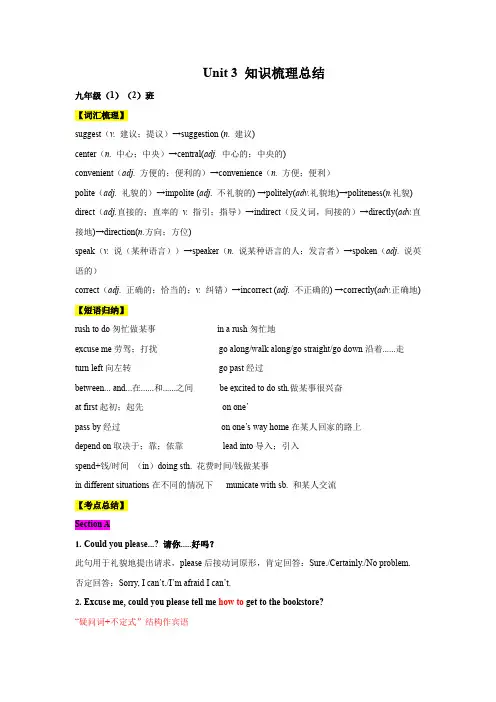
Unit 3 知识梳理总结九年级(1)(2)班【词汇梳理】suggest(v.建议;提议)→suggestion (n. 建议)center(n.中心;中央)→central(adj.中心的;中央的)convenient(adj. 方便的;便利的)→convenience(n. 方便;便利)polite(adj.礼貌的)→impolite (adj. 不礼貌的) →politely(adv.礼貌地)→politeness(n.礼貌) direct(adj.直接的;直率的v. 指引;指导)→indirect(反义词,间接的)→directly(adv.直接地)→direction(n.方向;方位)speak(v.说(某种语言))→speaker(n.说某种语言的人;发言者)→spoken(adj.说英语的)correct(adj.正确的;恰当的;v.纠错)→incorrect (adj. 不正确的) →correctly(adv.正确地)【短语归纳】rush to do匆忙做某事in a rush匆忙地excuse me劳驾;打扰go along/walk along/go straight/go down沿着......走turn left向左转go past经过between... and...在......和......之间be excited to do sth.做某事很兴奋at first起初;起先on one’pass by经过on one’s way home在某人回家的路上depend on取决于;靠;依靠lead into导入;引入spend+钱/时间(in)doing sth. 花费时间/钱做某事in different situations在不同的情况下municate with sb. 和某人交流【考点总结】Section A1.Could you please...? 请你.....好吗?此句用于礼貌地提出请求,please后接动词原形,肯定回答:Sure./Certainly./No problem.否定回答:Sorry, I can’t./I’m afraid I can’t.2.Excuse me, could you please tell me how to get to the bookstore?“疑问词+不定式”结构作宾语①how to do e.g. Please tell me how to deal with these old books.②what to do e.g. Could you please tell me what to do next.③when to do e.g. We haven’t decided when to start.3.问路及指路的表达方式.问路:Could you please tell me the way to...?Where is...?Do you know if there is a ... near here?Can you tell me how I can get to...?指路:Go along/Walk alone/Go down the street until...Turn left at the second turning/crossing.4.The bookstore is on your right, beside the bank.beside (prep.) 在......旁边;在.....附近 e.g. The bookstore is beside the mall.besides (prep.) 除.....之外(还)... e.g. We also like chemistry besides physics.5.You don’t need to rush.(1)作动词,意为“仓促;匆忙行事”rush out of冲出rush into 冲进......里(2)作名词,意为“仓促;匆忙”in a rush仓促;匆忙作名词,还可意为“特别忙碌的时期”at the rush hour在(交通)高峰期6.I was scared at first, but shouting did help.在英语中,通常把助动词do/does/did放在动词原形前,用以加强语气,意为“真的;的确”。
九年级人教版英语学习笔记Document serial number【NL89WT-NY98YT-NC8CB-NNUUT-NUT108】Unit1Howcanwebecomegoodlearners1、How引导的特殊疑问句:①询问方式或手段:“怎样”如:HowdoyoustudyEnglish?---Istudybyreadingaloud.②用于彼此间打招呼、问候、询问身体状况:如:Howdoyoudo---HowdoyoudoHowareyou---I’mfine/well/Ok.③询问天气或程度:如:How’stheweather=What’stheweatherlike?----It’ssunny/cloudy/raining.④询问年龄:如:Howoldisshe=What’sherage?---Sheis15(yearsold)⑤征求意见或建议用:Howabout=Whatabout+n/代词/V-ing.如:Howabout_______(play)basketball?⑥询问频率用:Howoften如:Howoftendoyouexercise---Onceaday.⑦询问可数名词的数量用:Howmany如:Howmanystudentsarethereinyourclass?---Thereare50studentsinourclass⑧询问不可数名词的数量用:Howmuch.如:Howmuchmeat____(be)thereinthefridge?---Onlyalittle.此外:Howmuch还可以用于询问价格。
Howmuchisyourcoat---It’s50yuan.注:询问价格用:Howmuchis/aresth=What’sthepriceofsth东西有贵(expensive=dear)贱(cheap=inexpensive),价格(price)有高(high)低(low)如:Thiscoatisverycheap. Thepriceofthiscoatisverylow.⑨询问次数用:Howmanytimes“多少次”如:Howmanytimesdoyougototheparkaweek?----Threetimes.⑩询问长度、时间长短用:Howlong如:Howlongistheboat----About3meters.Howlongwillyoustaythere?---For2days注:用Howlong提问,用:For+时间段或since+时间点回答(其中,for可以省略)。
人教版九年级英语知识点总结一. 重点短语1. pick up 拾起;接送;获得I’ll pick up my sister after school.2. be interested in 对…感兴趣I’m interested in playing the guitar.3. be famous for 因…而著名The city is famous for its beautiful scenery.4. be popular with 受…欢迎The new movie is very popular with young people.5. join in 参加We are going to join in the charity event.6. take turns 轮流We take turns to do the housework.7. make a difference 产生影响Your efforts will make a difference in the world.8. get along 与…相处I get along very well with my classmates.9. cut down 砍倒;减少We need to cut down the use of plastic bags to protect the environment.10. look forward to 期待I’m looking forward to seeing you again.11. put off 推迟The meeting has been put off to next Monday.12. come up with 提出We need to come up with a plan for the project. 13. keep in touch 保持联系We keep in touch by sending emails.14. make up 编造;弥补She made up a story about why she was late.15. run out of 用完We have run out of milk and need to buy some more.二. 重点语法1. 一般现在时肯定句:主语 + V原 + 其他He plays football every weekend.否定句:主语 + do not/does not + V原 + 其他I do not like watching horror movies.疑问句:Do/Does + 主语 + V原 + 其他Do they enjoy playing basketball?2. 一般过去时肯定句:主语 + V-ed/Vt + 其他She visited Beijing last year.否定句:主语 + did not + V原 + 其他We did not go to the concert last night.疑问句:Did + 主语 + V原 + 其他Did you finish your homework yesterday?3. 现在进行时肯定句:主语 + am/is/are + V-ing + 其他She is watching TV now.否定句:主语 + am/is/are + not + V-ing + 其他He is not playing football at the moment.疑问句:Am/Is/Are + 主语 + V-ing + 其他Are you studying for the exam?4. 一般将来时肯定句:主语 + will + V原 + 其他She will travel to Japan next month.否定句:主语 + will not + V原 + 其他I will not forget to call you.疑问句:Will + 主语 + V原 + 其他Will he come to the party?5. 现在完成时肯定句:主语 + have/has + V过去分词 + 其他They have finished their homework.否定句:主语 + have/has + not + V过去分词 + 其他We have not seen this movie yet.疑问句:Have/Has + 主语 + V过去分词 + 其他Have you ever been to Paris?6. 被动语态肯定句:主语 + am/is/are + V过去分词 + 其他The book is written by my favorite author.否定句:主语 + am/is/are + not + V过去分词 + 其他The dishes are not washed by my brother.疑问句:Am/Is/Are + 主语 + V过去分词 + 其他Is the car fixed by the mechanic?三. 重点词汇1. 人物teacher 老师student 学生doctor 医生nurse 护士engineer 工程师pilot 飞行员musician 音乐家actor 演员writer 作家scientist 科学家athlete 运动员2. 动作run 跑步jump 跳跃swim 游泳dance 跳舞sing 唱歌play 演奏climb 爬山cook 烹饪paint 绘画ride 骑行3. 环境house 房子school 学校hospital 医院office 办公室library 图书馆park 公园beach 海滩mountain 山river 河lake 湖四. 重点句型1. 八大情态动词can 能够I can speak English fluently.could 过去能够She could play the piano when she was five. may 可能May I go to the restroom, please?might 可能It might rain this afternoon.must 必须You must finish your homework before 8pm. shall 将要Shall we go to the movies tonight?should 应该You should study for the exam tomorrow.will 将要We will visit the Great Wall next week.2. 祈使句Be quiet! 安静!Don’t be late! 别迟到!Sit down, please. 请坐下。
九年级上册英语笔记第一单元人教版九年级上册英语第一单元笔记(人教版)一、重点单词。
1. textbook.- 名词,意为“教科书;课本”。
例如:Our textbooks are very useful for our study.(我们的课本对我们的学习非常有用。
)2. conversation.- 名词,“交谈;谈话”。
常用搭配:have a conversation with sb.(与某人交谈)。
例如:I had a long conversation with my teacher yesterday.(我昨天和我的老师进行了一次长谈。
)3. aloud.- 副词,“大声地;出声地”。
它和loudly的区别在于:aloud侧重于让人能听到,没有“喧闹”的意思;loudly侧重声音喧闹、嘈杂。
例如:Please read the text aloud.(请大声朗读课文。
)4. pronunciation.- 名词,“发音;读音”。
例如:His pronunciation is very good.(他的发音很好。
)5. sentence.- 名词,“句子”。
例如:Make a sentence with this word.(用这个单词造一个句子。
)6. patient.- 形容词,“有耐心的”;名词,“病人”。
例如:Our English teacher is very patient with us.(我们的英语老师对我们非常有耐心。
)- be patient with sb.(对某人有耐心)7. secret.- 名词,“秘密;秘诀”;形容词,“秘密的;保密的”。
例如:It's a secret between us.(这是我们之间的秘密。
)8. look up.- 动词短语,“(在词典、参考书中或通过电脑)查阅;抬头看”。
例如:If you don't know this word, you can look it up in the dictionary.(如果你不知道这个单词,你可以在词典里查阅它。
人教版九年级英语笔记整理Unit 1: Phrases1.Ask someone for help - to XXXXXX: When we face difficulties。
we should ask the teacher for help.2.XXX - XXXXXX: Listening to tapes is an effective way to XXX.3.Have ns with friends - XXX friendsXXX: We can XXX.4.Give a report - to present n to an audienceXXX: In class。
we may be required to give a report on a chosen topic.5.Spoken English - the use of language in XXX7.Finish doing something - to complete a task or activityXXX: XXX before I go to bed.8.At first - initiallyXXX: At first。
I found it challenging to learn a new language.9.Word by word - one word at a timeXXX: When XXX。
it's important to take it word by word.10.Be patient - XXXXXX: Learning a new language takes time。
so it's XXX.11.Because of - as a result ofXXX: I was afraid to XXX.12.Fall in love with - to XXXXXX: I fell in love with the culture and language of the country I visited.13.Look up - to search for nXXX: I had to look up the meaning of a new word in the nary.14.So that - in order toXXX: I study hard so that I can XXX.15.Take notes - to write down important nXXX: It's helpful to take notes during XXX.16.Learn from - to gain knowledge or XXXXXX: We can learn a lot from XXX.17.Keep a diary - to record daily thoughts and XXXXXX: XXX.18.The secret to - the key to achieving somethingXXX: The secret to learning a new language is consistent practice.19.Make mistakes - to have errors or faultsXXX: It's normal to make mistakes when learning a new language.20.Be born with - to possess a XXXXXX: Some people are born with a talent for music.21.The ability to - the capacity or skill to do somethingXXX: XXX.22.Whether or not - regardless of whetherXXX: XXX.23.Be interested in - to have a XXX somethingXXX: I am XXX.24.Depend on - to rely on or be XXXXXX: XXX.25.In common - shared characteristics or traitsXXX: We have a lot in common with people who share our interests.26.Connect。
英语人教版九年级全一册笔记以下为您生成 20 个关于人教版九年级全一册的英语笔记示例,包含英语释义、短语、单词、用法和双语例句:---## 1. “achieve”- 英语释义:to successfully complete something or get a good result, especially by working hard- 短语:achieve one's goal 实现目标- 用法:其后常接名词或动词的 -ing 形式- 双语例句:- He achieved his dream of becoming a doctor. (他实现了成为医生的梦想。
)- She has achieved great success in her career. (她在事业上取得了巨大的成功。
)## 2. “ancient”- 英语释义:belonging to a time long ago in history- 短语:ancient history 古代历史;ancient civilization 古代文明- 用法:通常用于形容与过去久远时期相关的事物- 双语例句:- The ancient building is very beautiful. (这座古建筑非常漂亮。
) - Ancient Egyptians were very skilled in building. (古埃及人在建筑方面技艺精湛。
)## 3. “attention”- 英语释义:notice, thought, or care- 短语:pay attention to 注意;draw attention 引起注意- 用法:“pay attention to” 后接名词、代词或动名词- 双语例句:- Please pay attention to your spelling. (请注意你的拼写。
)- His strange behavior drew attention. (他奇怪的行为引起了注意。
新人教版九年级英语全册知识点总结 (课堂笔记)Unit 1: Meeting your new classmatesVocabulary- Greet: 问候- Exchange: 交换- Contact details: 联系方式- Get along with: 相处融洽- Cooperation: 合作Sentence patterns- What's your name? (你叫什么名字?)- Nice to meet you. (很高兴见到你。
)- Can you spell it? (你能拼写一下吗?)- How do you spell it? (你怎么拼?)- Where are you from? (你来自哪里?)- What about you? (那么你呢?)- What's your phone number/email address? (你的电话号码/邮箱地址是多少?)- Let's exchange contact details. (咱们交换一下联系方式吧。
) - How do you like your new school? (你觉得新学校怎么样?)- I'm getting along well with my classmates. (我和同学相处得不错。
)Unit 2: School lifeVocabulary- Education: 教育- Facilities: 设施- Clubs: 社团- Activities: 活动- Schedule: 课程表Sentence patterns- Our school provides high-quality education. (我们学校提供高质量的教育。
)- We have modern facilities like a library, sports ground, and labs. (我们有现代化的设施,如图书馆、运动场和实验室。
初中英语学习材料madeofjingetieji英语笔记整理Unit1短语1.ask sb for help 向某人寻求帮助We should ask the teacher for help when we are in trouble .2.listen to tapes 听录音eg.listening to tapes is a good way to practice listening .3.have conversations with friends 和朋友做对话4.give a report 作报告5. spoken English 英语口语7.finish doing something 8. at first 首先9.word by word 逐词10.be patient 耐心的10. be afraid to do = be afraid of doing 害怕11. because of 由于12.fall in love with 爱上Eg, I was afraid to ask question because of my poor pronunciation。
13.look up 查找eg。
I look them up in a dictionary。
14.so that 为了15.take notes记笔记eg. We should take notes in class16.learn from 向..学习eg we should learn from him .17.keep a diary 写日记18.the secret to …的秘诀19 make mistake 犯错eg . I often make mistake in grammar。
20. be born with 天生具有21. the ability to …的能力Eg Everyone is born with the ability to learn.22. whether or not 是否23.be interested in 对…感兴趣24.depend on 依靠取决于eg . we shouldn’t depend on our parents.25.in common 共同点26.connect… with 和…连接起来eg :Good learners have some good habits in common.27.pay attention to 留心eg。
Please pay attention to your spelling .28.be good at 擅长29.even if \though 即使30.think about 考虑31.write down 写下来32.look for 寻找33.find out 找出34.have trouble doing 做…有困难Eg I have trouble learnin g English . 句型与语法1.----How do you study for a test ? ---I study by working with friends .2.what about / how about +ving ..怎么样Let’s +do 让我们提建议why not + do 为什么不why don’t+do 为什么不3. have/has +p.p Eg I have studied with a group .4.the+比较级the+比较级Eg The more you read .the faster you will be .5.find it adj to do sth 发现做... 如何I find it difficult to learn English .6. so adj/adv…that +句子The teacher spoke so quickly that I didn’t understand her most of time .7.something interesting形容词修饰不定代词,形容词后置8.how to do 疑问词+不定式egI don’t know how to learn English .9.I don’t have a partner to practice English with. With不能省略10.it is adj to do 做什么事怎么样It is difficult for me to learn English .11. success 名词successful 形容词successfully副词succeed 动Unit2短语1.put on 增加eg: I have put on five pounds.2. be similar to 相似y out 摆开布置4.admire the moon 赏月5.as a result 结果6.throw…at 抛向,洒向eg: people throw water at each other .7.wash away冲走eg: The flood washed away the houses8.in the shape of …的形状eg:Mooncakes are in the shape of the moon .9.shoot down射落eg Houyi shot down the nine suns . 10.ask for 要求11. plan to do sth 计划eg : I plan to go to Beijing . 12. care about 关心13.refuse to do sth 拒绝14.end up 结束15.dress up 装扮16.share with 分享egWe should learn to share happiness with others .17.wake up 醒来18. in need 处于需要之中d =called 被叫20.remind…of 使…想起eg:The picture reminds me of my childhood .21.warn sb to do something 警告某人做某事22.play a trick on 开玩笑23.decide to do决定做eg: I decide to take notes carefully .24.promise to do承诺做eg: Jim promised to be a good person .句型与语法1.what a nice day ! 感叹句由what与how引导what +a\an+形容词+单数n+(主语+谓语)what+形容词+n复数\不可数n+(主语+谓语)how+形容词\副词+主语+谓语2.try to do sth 尽力做某事\ try doing sth 尝试做某事3. used to do sth 过去常常eg: I used to be shortbe used to doing习惯于做某事eg: I am used to getting up early.be used to do sth 被用来做eg: Cars are used to drive .5.宾语从句1)在主句中担当宾语的从句称为宾语从句。
2)宾语从句三要素:连接词,时态,语序。
连接词:whether:用于一般疑问句;殊疑问词(what how 等)用于特殊疑问句时态:当主句是一般现在时态时,从句用任意时态;当主句一般过去时态时,从句描述的使客观真理,用一般现在时语序:宾语从句用陈述句语序Unit 31. a pair of 一双2.go along \down 直走3. turn right \left 左\右转4.on your right \left 在左\右手5 between…and在..之间6.pass by 经过6. next to 挨着7. across from在…对面8.in front of 在..前面9.start with 开始10.a good place to do 做..的好地方11.on …way to 在…的路上eg: on my way home 在我回家的路上13. sb spend 时间\金钱doing sth \ sb spend 时间\金钱on stheg: I spent two hours doing my homework\ on my homework. .sth cost sb 金钱eg: The notebook cost me two yuan .花费It takes (took) sb 时间|金钱doing sthEg: It takes me two yuan to buy the notebook .sb pay 金钱for sth eg: I paid two yuan for the notebook.unit 4ed to+V原型过去常常eg: I used to be short . 我过去很矮。
be used to doing sth 习惯于做某事eg: I used to getting up early .我习惯于早起。
2.be afraid of 害怕… eg: I am afraid of being alone . 我害怕独自一人。
3.brave enough 够勇敢eg :I am brave enough to ask question .我够勇敢去提问。
4.be interested in=take an interest in 对…感兴趣interesting--物interested--人5.be on …team 在…队里6. from time to time 有时7.such a great idea 多么好的主意啊such+ a\an +adj +名词8.see sb do sth看见某人做某事的全程see sb doing sth 看见某人正在做某事9.19-year-old girl 19岁的女孩连字符连接用单数,相当于形容词。
10.deal with =do with 处理deal with 用how提问do with 用what提问11.dare to do sth 敢于做某事12.in front of 在…前面eg: I dare to sing in front of the class .我敢在全班面前唱歌13.not …anymore \longer 不再14.tons of 许多,大量eg: My mother isn’t young anymore 我妈妈不再年轻。